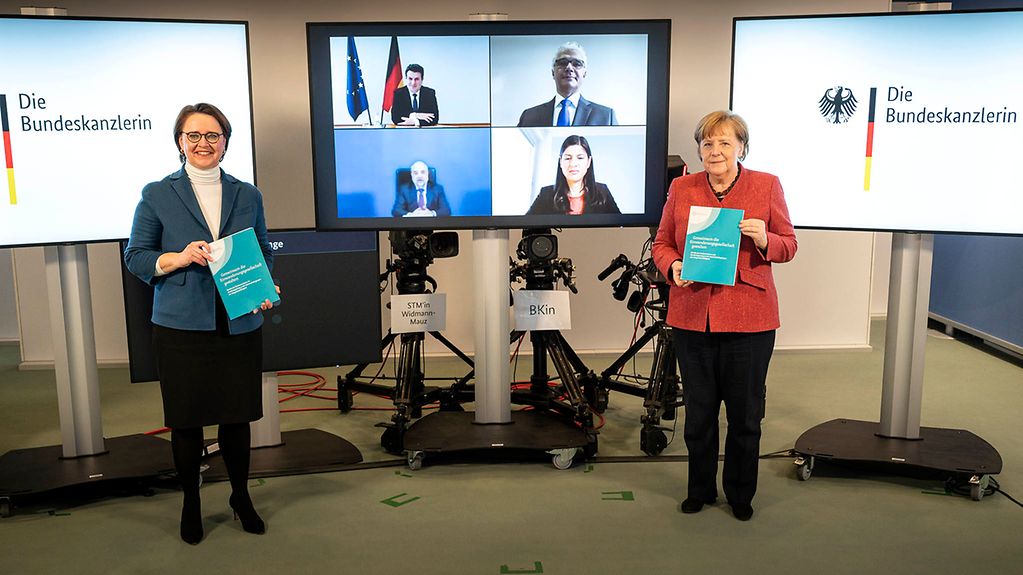Commission presents report on integration capability
On Wednesday Chancellor Angela Merkel was presented with the report on integration capability. In it, the Expert Commission on the Framework Conditions for Integration Capability lays out recommendations for advancing integration in Germany. It is clear that we have made progress, said the Chancellor, but that there is still work ahead of us.
4 min reading time

Chancellor Angela Merkel and Minister of State Annette Widmann-Mauz, Federal Government Commissioner for Migration, Refugees and Integration, at the presentation of the report
Photo: Bundesregierung/Bergmann
At an online meeting on Wednesday, the Chairs of the Expert Commission on the Framework Conditions for Integration Capability, Derya Çağlar and Ashok Sridharan, presented the report "Shaping our immigration society" to Chancellor Angela Merkel and Minister of State Annette Widmann-Mauz, Federal Government Commissioner for Migration, Refugees and Integration. The Federal Minister of Labour and Social Affairs Hubertus Heil and Markus Kerber, State Secretary at the Federal Ministry of the Interior, Building and Community, also attended.
Opportunities and risks
In its final report, the independent expert commission provides an overview of the status and the future of integration policy in Germany. The focus is on the correlation between migration and integration and the fields of German language development, labour market integration, education, housing and health. The report also addresses social cohesion and the dangers posed by racism, right-wing extremism and terrorism. The expert commission has created its own website, where its report is posted and where it reports regularly on its work.
The recommendations will be discussed within the German government and by the Cabinet. The report will then be submitted to the German Bundestag and the Bundesrat, the two houses of the German parliament.
Integration is an ongoing task for all of us
The Chancellor stated that the high numbers of immigrants arriving in Germany in recent years means we have a mountain of work, with a great deal of integration work to be done. "This is true both at the level of the state and always also on the part of the individuals involved," said Angela Merkel. We need to really focus on integration and immigration so that we do not negate all that has already been achieved, she added. The members of the expert commission would like to decouple integration from migration and see it in a much wider context than has hitherto been the case. Integration is a process that affects society as a whole and thus needs everybody to make an effort. And integration is an ongoing task.
Creating a new sense of community in Germany
The expert commission is convinced that Germany needs to develop an open understanding of "being German" with criteria of belonging. This is intended to underline the diversity of Germany as an immigration country, and lay the foundations for living well together, and developing a new sense of community. Nevertheless there will always be different visions and controversial debate over the form migration and integration policy should take.
The independent commission has 24 members, who come from the academic community and from practical integration. It is chaired by Derya Çağlar, who is a member of Berlin’s parliament, and Ashok Sridharan, the former Lord Mayor of the Federal City of Bonn.
Seeing migration as an opportunity
"Well trained specialists will have an opportunity, which means that education and vocational training are obviously key to ensuring genuinely equal opportunities," declared Chancellor Angela Merkel when the report was presented. The expert commission believes that the percentage of the total population of Germany accounted for by immigrants and their descendants will continue to rise over the decades to come.
Migration brings many opportunities. Open societies can benefit from greater cultural and social diversity. If immigrants are successfully integrated into education and the labour market, the economic benefits can be significant and fiscal revenue generated for the welfare state. This is particularly true in view of demographic change.
Integration means participation
Immigration enhances diversity, as the report clearly illustrates. A good quarter of Germany’s population have now either emigrated to Germany themselves or are descendants of immigrants. Ensuring equal opportunity to participate means working towards ensuring that members of all sections of society are appropriately represented at all levels of the hierarchy, in line with their qualifications and their abilities. That applies to the political level, as well as to administration, business, science and research, culture, the media and civil society.
The commission believes that state institutions should be opened up such that they reflect the diversity present in society. The actions of the state do, after all, send a signal to society as a whole. That applies for immigrants and their descendants just as it does for other potentially disadvantaged groups within society.
The coalition agreement stipulated that an expert commission would be appointed by the German government to look at the framework conditions for integration capability, and that this commission would produce a report for the German Bundestag.